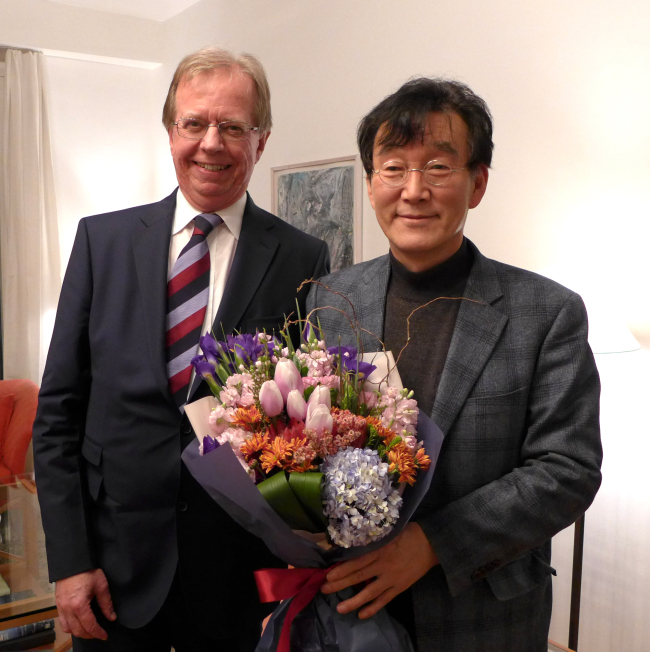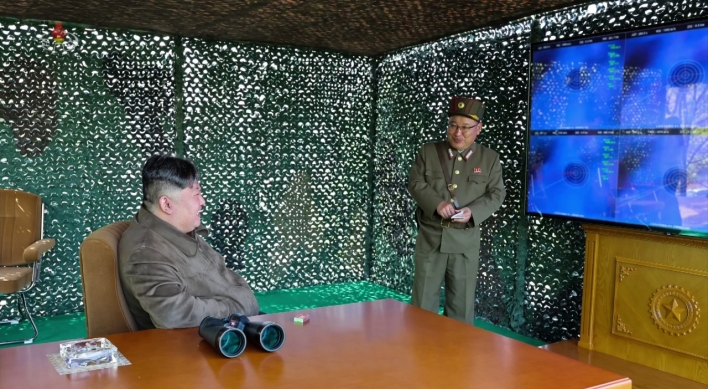Literature-loving foreign diplomats had the opportunity to hobnob with a distinguished Korean author at a gathering in Seoul last week.
The Seoul Literary Society hosted Ha Il-ji, a novelist renowned for breaking boundaries and setting trends in the literature scene.
“I wanted to be a writer as a child and have walked the path of literature all my life,” said the 60-year-old author at the Swedish ambassador’s residence in Seoul on Tuesday.
“As a yokelish boy from the countryside, I was shocked after reading Shakespeare’s ‘Hamlet.’ It had a combination of unconventional form and timeless universality, the two values that left a lasting imprint on my life’s work.”
The Seoul Literary Society hosted Ha Il-ji, a novelist renowned for breaking boundaries and setting trends in the literature scene.
“I wanted to be a writer as a child and have walked the path of literature all my life,” said the 60-year-old author at the Swedish ambassador’s residence in Seoul on Tuesday.
“As a yokelish boy from the countryside, I was shocked after reading Shakespeare’s ‘Hamlet.’ It had a combination of unconventional form and timeless universality, the two values that left a lasting imprint on my life’s work.”

Ha discussed his 10th novel, “The Republic of Uzupis,” which delves into human nature and nostalgia.
“As mankind’s universal character, I believe all people have certain longings for the past,” Ha told the guests. “This novel had given shape to our nostalgia, those sentiments coming from life’s losses and deep inside our hearts.”
Published in 2009, the book tells the story of a 40-year-old Asian man, Hal, who travels to Lithuania in search of his lost homeland ―the Republic of Uzupis ― to bury his father’s ashes.
Uncertain about the existence of the republic, Hal wanders through streets of Vilnius, described in melancholic and surreal terms, before he eventually commits suicide in a deserted apartment.
Uzupis, meaning “on the other side of the river,” is a neighborhood in the center of the Lithuanian capital Vilnius. Originally a haven for bohemian artists and writers, the town declares itself a sovereign republic on April Fool’s Day.
Ha first visited Lithuania in January 2000 to meet his publisher-friend Kerry Shawn Key.
“I was struck by the strong impression I got on my visit,” Ha said. “Vilnius was a barren, dreary city with breathtakingly beautiful women and depressed-looking men, an independent country just waking up from Soviet rule.”
Ha said that he originally wrote a screenplay for a movie, but the plan fell through for financial reasons. The novel has been translated into Lithuanian, English, French and Czech.
When writing a novel, he has to finish it within 40 days due to his limited time off from teaching at a university, Ha said. “I finish a bottle of whiskey every two or three days to keep total concentration on my work.”
The prominent author pointed out that in contrast to nonfiction, fiction is created almost entirely from the writer’s imagination and impression: “Novelists do observe the world with a keen eye, but the process involves composing bits of our experiences into a narrative.”
Ha quipped, “As you age, it is not easy to keep your senses in tune with the times. Readers don’t want to read old-fashioned, fogeyish stories.”
Ha said he thinks of himself not as a Korean writer, but one among the world’s many writers. Ha is currently the Korean ambassador to the Uzupis Republic.
“Literature is an intangible asset for our spirit and culture,” Ha said. “It enriches our insights into life, stimulates our sensibilities and makes us into unique and attractive individuals.
“But our education churns out students with industrial mindsets,” he warned. “A society which does not value literature is a numb, unmindful society.”
After majoring in creative writing at Chung-Ang University in Seoul, Ha received his M.A. at the University of Poitiers and Ph.D. at the University of Limoges in France.
His first novel, “The Road to the Racetrack” (1990), made him a star overnight in Korea for its unorthodox style and controversial critique of social conventions.
“People viewed my work as immoral and idiosyncratic and cursed in detest,” Ha said.
Ha wrote four more “Racetrack” novels in the next three years: “Racetracks at Crossroads” (1991), “For Racetracks" (1991), "An Alder Tree at the Racetracks” (1992) and “What Happened at the Racetracks” (1993).
These novels embroiled Ha in a series of debates with Korea’s conservative literary critics in what became known as the “Racetrack controversy.”
In a literary review in 1990, he said he always asks himself what, how and why to write ― principles that still guide his approach.
“On the ‘what’ question, I try to write about human beings and their situations. They are individuals neither better nor worse than us; those who can be us,” Ha said.
“On the ‘how’ question, I strive to write things as realistically as possible. If I describe things through the lens of my intentions, I end up distorting the reality. Authors must take moral responsibility for that.
“On the ‘why’ question, I believe portraying reality truthfully makes beautiful and aesthetic works. Also, I write in order to free readers’ minds.”
Ha has written over 12 novels, two collections of poems and several essays. He teaches creative writing at Dongduk Women’s University in Seoul, where he currently serves as dean of the College of Humanities.
The gathering, now in its 37th run, was started by previous Swedish Ambassador to Korea Lars Vargo in 2006. Vargo, a literary enthusiast, translated many Japanese and Korean works into Swedish.
Previous guests have included Korean poet Ko Un and novelists Park Wan-so, Kim Young-ha, Hwang Suk-yong, Yi Mun-yol and Jung Young-moon.
By Joel Lee (joel@heraldcorp.com)
-
Articles by Korea Herald



![[AtoZ into Korean mind] Humor in Korea: Navigating the line between what's funny and not](http://res.heraldm.com/phpwas/restmb_idxmake.php?idx=644&simg=/content/image/2024/04/22/20240422050642_0.jpg&u=)



![[Herald Interview] Why Toss invited hackers to penetrate its system](http://res.heraldm.com/phpwas/restmb_idxmake.php?idx=644&simg=/content/image/2024/04/22/20240422050569_0.jpg&u=20240422150649)

![[Graphic News] 77% of young Koreans still financially dependent](http://res.heraldm.com/phpwas/restmb_idxmake.php?idx=644&simg=/content/image/2024/04/22/20240422050762_0.gif&u=)






![[Exclusive] Korean military to ban iPhones over security issues](http://res.heraldm.com/phpwas/restmb_idxmake.php?idx=652&simg=/content/image/2024/04/23/20240423050599_0.jpg&u=)



